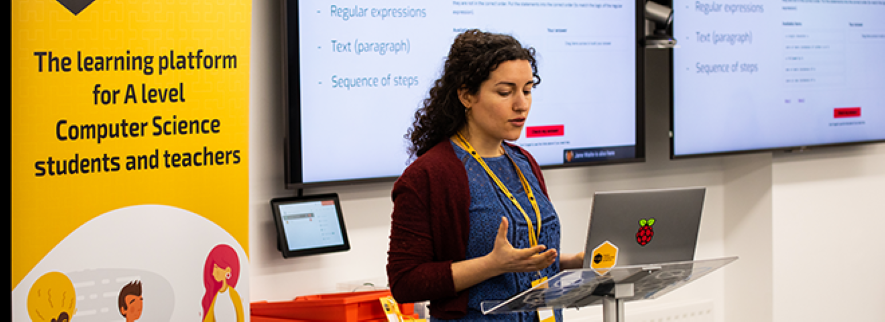
Submitted by Rachel Gardner on Mon, 04/05/2020 - 15:16
A Computer Science learning platform developed by experts from this department and the Raspberry Pi Foundation has just added new materials to provide extra support for those learning or teaching A Level Computer Science from home.
The Isaac Computer Science platform now covers the whole of the AQA and OCR A Level Computer Science syllabus. Free to use, it provides content, exercises to complete and a wide range of features for teachers such as gradebooks and auto-marked homework assignments.
Nine new topics were launched on the platform in late April, as part of work to offer extra learning support during lockdown, and new live online teacher training and student workshop events have also been added. This has already proved very popular. After the new material was added, there was an all-time record – 31,418 – for the number of weekly question attempts students made on the platform.
Isaac Computer Science (which builds on the success of its sister site, Isaac Physics) was created with funding from the Department for Education. It was one of the government initiatives announced in 2018 to improve the teaching of Computer Science in UK schools and is part of the UK's National Centre for Computer Education. The development of the online platform for the Isaac projects is led by our colleagues Professor Alastair Beresford and Dr Andrew Rice working with a technical team of six colleagues.
Both Isaac platforms (Computer Science and Physics) were developed in response to growing concerns a few years ago that the teaching of these subjects at A Level was not adequately preparing students to study them at university. "In particular, it was felt that more needed to be done to foster students' problem-solving skills," Alastair says.
And in the case of Computer Science, "it was also felt that we should be encouraging students not just to learn how to use existing computer software packages – important though that is – but to aspire to learn how to program the computers themselves," Alastair adds. "Such skills are essential to the UK economy – and as it happens, in the current crisis the computer programming sector is one that’s working really well."
Isaac Physics was developed first, launching in 2015. It has proved very popular and, at peak periods of the school year, has seen as many as 800,000 question attempts per week.
It was then joined last year by Isaac Computer Science. But both platforms run collaboratively. "We provide the technological platform, run the analytics, and think about how the technology/pedagogy interaction will work such that we can create innovative ways of setting and marking students’ work," Alastair explains. "Our partners – the University of Cambridge Department of Physics (for Isaac Physics) and Raspberry Pi (for Isaac Computer Science) – deliver the content, the events and the outreach."
 Both platforms use web technology and computer-based educational techniques to improve the teaching of the subject, including facilitating interaction between teachers and students. "We started with multiple-choice and numeric-answer questions, which are very simple for a computer to mark," says Andrew Rice, "and even this simple style showed measurable learning benefits."
Both platforms use web technology and computer-based educational techniques to improve the teaching of the subject, including facilitating interaction between teachers and students. "We started with multiple-choice and numeric-answer questions, which are very simple for a computer to mark," says Andrew Rice, "and even this simple style showed measurable learning benefits."
And providing support for both sets of users is key. "If we want students to use the platform, we have to encourage teachers to use it," Alastair says. "We learned from developing the Physics platform that teachers would use it if, as well as offering lots of challenges for the students, it also supported classroom teaching."
So the auto-marked questions that students can work through both give them an automated assessment and allow teachers to see, in real time, how their students are faring as they work their way through the problem set.
They are helped in doing so, not by seeing the answers – "because we never give those," says Alastair – but through a series of graduated hints. If students choose to use the hints, it will guide them in the steps they need to take to solve the problems.
Though the Computer Science platform now covers all the curriculum topics, development work on it still continues. One feature in the pipeline is the auto-marking of short 'free text' answers (i.e. sentences of up to 20 words). This is much harder than auto-marking answers in the form of mathematical equations or Boolean logic.
"We’re currently marking free text answers using some rule-based technology from the Open University," says Alastair. "But we’re also seeing success with automatically trained computer models using machine-learning techniques."
However, he adds, there is still work to be done here. "The challenge is to get the accuracy of the system high enough that it enhances learning and provides a time-saving for teachers."


